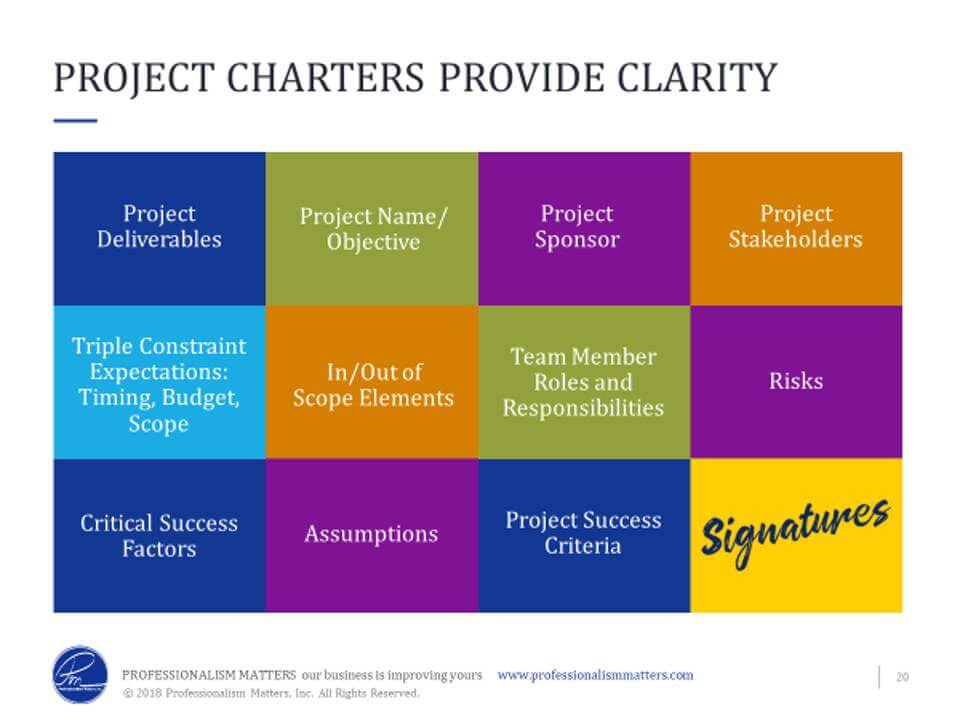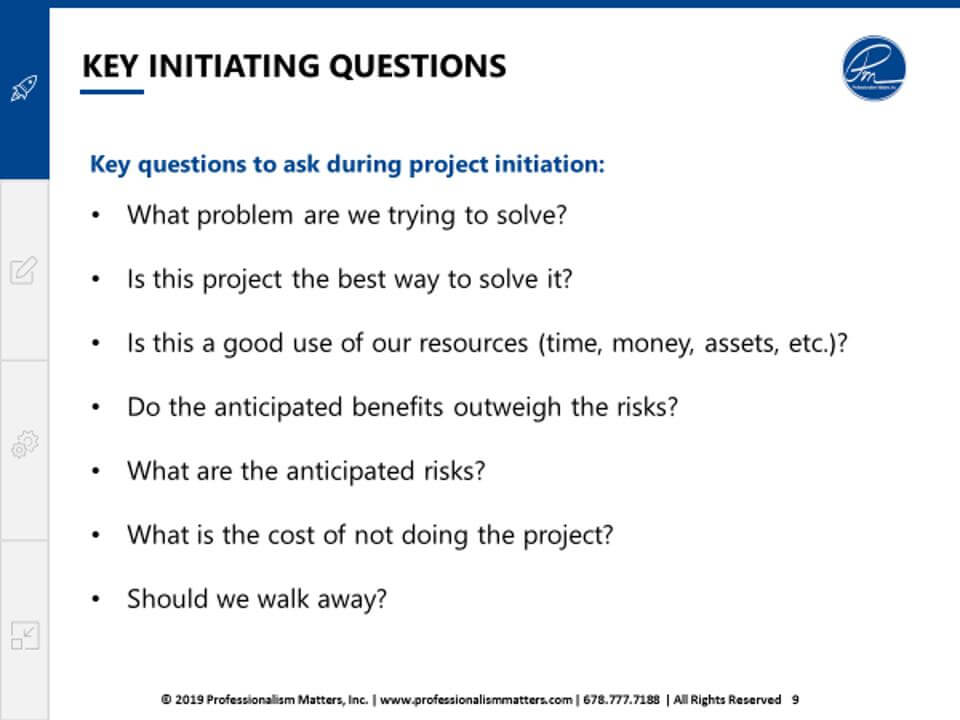4 Project Management Skills Requiredto Install Digital Signs Effectively & Efficiently

Believe it or not, over the years I’ve gotten more requests to provide Project Management training to non-project managers than project managers. That may seem counter intuitive but not really. Organizations realize the benefits of those project management skills and abilities, and they need everyone to have that skill set, not just their official “project managers.” While most professionals may not carry the formal title “Project Manager,” virtually everyone manages projects from time to time. If you’ve organized a kid’s birthday party, coordinated a family reunion or planned a team retreat, you’ve managed a project!
According to Michael DePrisco, Vice President Global Solutions, Project Management Institute (PMI) research shows that, “We’re moving to a project economy. It’s just becoming how work gets done.” Further support for the view of project management skills being universally applicable and beneficial is the fact that PMI established an Educational Foundation targeting kids aged 5-19. Indeed, the foundation helps equip children with project management skills because the fundamental belief is…project management skills are life skills.
Project Management books are filled with concepts and skills that could benefit most professionals including scheduling techniques, Gantt charts, work breakdown structures, team leadership concepts, etc. While these skills (and many others) are certainly valuable ones for project managers and non -project managers, alike, Mach1Design.Digital highlights four specific skills that may be lesser known but clearly provide tremendous benefit for digital sign installations.
Skill #1 – Using Project Charters

The discipline of project management is filled with tools, techniques and templates, but hands down the most powerful one overall may be the project charter. Many organizations struggle with the disease of “the right hand not knowing what the left hand is doing” or they have teams that fumble key initiatives in large part because people “aren’t on the same page.”
Project Charters are used by project managers to get everyone in agreement at the outset so they can avoid problems down the road. Here’s an example of some of the types of elements you may want to clarify through the development of a project charter before the work actually begins.
While project charters may vary in style, format, and even content, the fundamental premise of getting the key players together to reach consensus on these critical elements before project kickoff is invaluable. Securing signatures on the document only enhances the levels of accountability.
Skill #2 – Vetting Ideas to Weed Out the Bad Ones
Years ago when the ill-fated OJ Simpson book project “If I Did It: Confessions of the Killer” was cancelled at the last minute amid public outrage and advertiser backlash, Rupert Murdoch Chairman of the News Corporation offered a statement where he announced the book cancellation characterizing it as “an ill-considered project.” While the book had reportedly already been written and copies had been boxed for retailers to sell, this seemed a perfect example of the common and pervasive phenomenon – failure to properly vet a project idea.
To avoid this phenomenon, project management teaches that contrary to popular belief “Initiating” NOT “Planning” should be the first phase of project management. The Initiating phase is focused on subjecting the idea to some level of scrutiny whether it’s as complex as a full-blown business case or as simple as a back of the envelope review of pros and cons. When this up front analysis doesn’t happen, “dog projects” can be birthed from dangerous triggers like an executive’s rambling commentary during a meeting, an ill-advised or uninformed opinion or an emotional response to an incident. While the Initiating process can take many forms, here are some key questions to consider as part of that process.

Skill #3 – Conducting Risk Analysis
While plans are great, everyone knows that they rarely materialize exactly as anticipated. Stuff happens, right? Instead of being blindsided by every unexpected twist and turn, project managers are taught to conduct risk analysis as part of the normal project planning process. Harry Hall, The Project Risk Coach insists “we are all risk managers, some better than others.” At its core risk analysis is about planning for what might go wrong, and blindly executing projects without taking time to conduct some level of risk analysis is naïve if not outright dangerous. The unfortunate reality is that organizations do it all the time! They barrel forward just hoping for the best and usually just pay the price later.
The selection of risk analysis method isn’t nearly as important as taking action based on the findings. Remember that risk analysis findings can be used to…
- Help deliver a difficult message to a senior leader or stakeholder
- Make the case for additional resources, support or even a different course of action
- Minimize team anxiety about “what could go wrong”
- Provide opportunities to avoid/minimize risks through proactive mitigation and backup planning for key tasks
Skill #4 – Debriefing Projects
Insanity has famously been defined as doing the same thing over and over and expecting a different result. It sounds crazy, but most organizations engage in it all the time. Why? Because once a project or task is over, invariably there’s a mad dash to get started on the next one without taking a moment to consider potential future changes. Indeed, that reflexive response often robs us of the opportunity to use what we learned on the last project to enhance future projects. While some environments like hospitals and the military who deal in life and death on a daily basis reportedly include debriefing (or post mortem type activities) as a part of their normal course of work, many others overlook it which is a huge missed opportunity. Debriefing can be applied to meetings, key events, projects and even tasks. The goal is simply to take some time at the end (or even along the way for longer projects) to reflect on what worked well and what could have been done differently. Understanding the errors (or successes) of the past is a necessary element of continuous improvement, and professionals who are skilled in this practice enhance their value to the organization.
While these four skills aren’t exclusive to project management, they’re widely recognized and practiced within the discipline and unfortunately overlooked by many outside the discipline. So, if you’ve been thinking project management skills are just for career project managers, think again! Project management skills may not just enhance your effectiveness in the workplace, but they can also significantly increase your value in the marketplace.
Let Mach1Design.Digital Handle the Stress
At Mach1Design.Digital, whether you’re a customer buying a new digital sign system or a manufacturer needing your sign installed for a customer, our client success managers are here to make the process easier. We’ll make sure every phase of your project is organized and streamlined for a successful, timely install.
Every client has their own dedicated success manager who will oversee the entire process and be your single point of contact for any questions that may arise. They’ll partner with you from the day your install order is received to schedule and coordinate every aspect of sign deployment. As your main point of contact, your success manager will:
- Manage all documentation and equipment delivery
- Liaison with your customer for permitting
- Coordinate install, concrete and electrical services
- Initiate training and technical support for the customer
Our project managers work with your team to oversee timelines and scope of work, and will consistently monitor progress against install goals. They’ll supervise the quality of deliverables and ensure every aspect of your project is completed on target so you have a seamless, satisfying experience:
- Project Kickoff: We’ll step through the deployment process, technical requirements, milestones and timelines with your entire digital signage team.
- Creative Services: If you’re client needs any content design services, we’ll coordinate directly with your branding team on the content plan and design specs.
- Software Implementation & Basic Configuration: Our team will install, license and configurethe software so your content can begin to play on screens.
- Training: Sit in on instructor-led classes and explore our online LMS with a training subscription to take advantage of every feature and workflow.
- Managed Services: We can help with advanced configuration like setting up playlists, organizations and user accounts, configuring data-mapped content and creating fill-in message templates.
- Client Support: You can contact your client success manager at any time for help. You can reach Digital Client Supportby email, phone or schedule a support session online.

Let us know what you need
We serve all industries: Retail, Business, Restaurant, Education, Healthcare, Church, and many more.
By clicking “Submit”, I consent to being contacted by a representative of Mach 1 Design Digital Signs.
Copyright © 2021 Mach 1 Design | All Rights Reserved | ADA Compliance